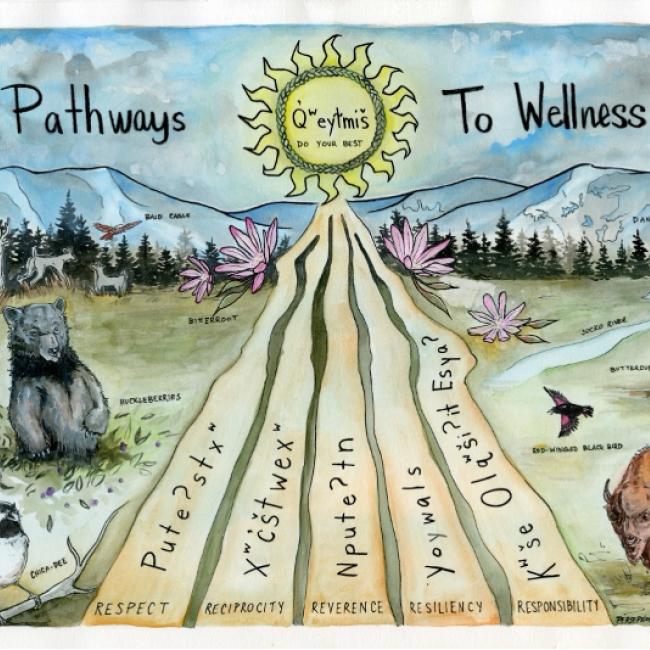Project Summary
Through a partnership between the Confederated Salish and Kootenai Tribes (CSKT) of the Flathead Nation, two school districts on the Flathead Nation, and the University of Montana (UM), the project team is working to better understand how schools serving Indigenous students can co-develop culturally responsive interventions with their communities to support Indigenous children’s educational success and wellbeing. Previously the project team and their partners in the Arlee School District co-created Pathways to Wellness, a strengths-based, culturally-responsive social-emotional learning (SEL) intervention composed of Indigenous and Western knowledge for children, educators, and families through community-engaged research. The team’s aim is to expand the Pathways to Wellness intervention and disseminate a model for co-adaptation of Indigenous-led, school-based interventions to other Indigenous communities to help advance health equity and transformative educational change.
Research Questions/Aims
- Build capacity for expanding the Pathways to Wellness to other communities’ contexts through fostering relationships, assessing needs, and identifying implementation barriers and facilitators in school-community engagement;
- Co-adapt the intervention for elementary school students, educators, and families in the new communities; and
- Evaluate the Pathways to Wellness intervention impacts on students, educators, families, and the systems that influence their wellbeing.
- To evaluate the intervention’s impact on children, the team asks:
- What is the impact of the intervention on Indigenous children’s social-emotional competencies and wellbeing?
- What are children’s experiences during the social-emotional learning intervention? How do they perceive the intervention in terms of (a) cultural connection and (b) supportive adult engagement to foster their cultural awareness?
- To evaluate intervention impact on educators, families, and the systems that influence children’s wellbeing, the team asks:
- What is the impact of the intervention on educators’ professional strengths and cultural awareness?
- What is the impact of the intervention on family-school engagement?
- To evaluate the intervention’s impact on children, the team asks:
Actionability
- Expansion of the Pathways to Wellness to other communities’ contexts through fostering relationships, assessing needs, and identifying implementation barriers and facilitators in school-community engagement;
- Inform the Confederated Salish and Kootenai Tribes of the Flathead Nation Council, Education Department, Séliš-Ql̓ispé Culture Committee, School Boards, community advisory boards, educators, and families in the local communities, regarding incorporating culturally responsive social-emotional learning into schools serving Indigenous students.
Outcomes
Health: Wellbeing of Indigenous children
Other: Educational success of Indigenous children
Methodology
The project team is conducting focus groups and interviews with children, caregivers, educators, and community members to understand barriers and facilitators in school-community engagement. Additionally, the team will use ethnographic research to observe classrooms and attend school-community events to gain people’s locally situated understandings of constructs such as belonging, culture, and identity. From their field notes, consented recordings, and transcripts from those interviews, the team will use thematic analysis to identify occurring themes related to the needs, barriers, and facilitators. The team will then co-adapt the Pathways to Wellness intervention to the new communities to meet their needs. In order to evaluate the intervention’s impact on children, educators, and families, the team will employ convergent mixed methods with concurrently collecting quantitative and qualitative data to test the social-emotional learning intervention in two new elementary schools and their communities from Fall 2026 to Spring 2027.

University of Montana
Confederated Salish and Kootenai Tribes of the Flathead Nation
Arlee School District